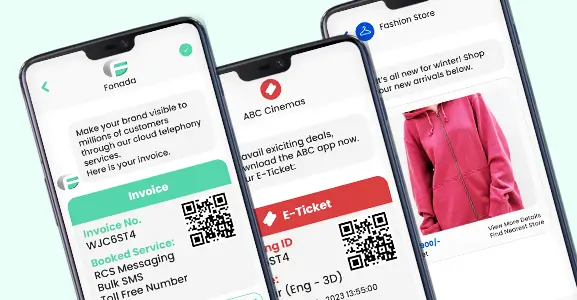INTERACTIVE
VOICE RESPONSE (IVR) SYSTEM FOR BUSINESSES
The Ultimate Solution for Identifying and Routing Every Call to the Best Suited Agent Based on Caller Input

What Is IVR Phone System?
IVR Phone System (Interactive Voice Response Phone System) is an automated telephony architecture that allows businesses to interact with customers through pre-recorded voice messages and touch-tone keypad inputs.
The IVR Phone System plays a pre-recorded message that guides callers to select an option or enter information via the keypad. With each caller’s input, the IVR system can provide relevant information, transfer the call to the appropriate agent or department, or even perform a transaction. IVR Phone System is commonly used by businesses to handle a large volume of calls, deliver exceptional customer service, and streamline overall operations.


What Are The Different Types Of IVR Systems?

IVR For Self-Service
An automated IVR system, also known as an IVR (Interactive Voice Response), enables businesses to handle large call volumes at a reduced expense. It can recognize and direct callers, as well as resolve their inquiries without having to transfer them to a human agent. Calls are transferred to live agents solely when the caller demands additional support.

Hosted IVR
Implementing an IVR phone system on a cloud-based software platform allows businesses to access the IVR application online. This facilitates the provision of round-the-clock customer service, even outside of standard office hours, leading to enhanced customer loyalty and improved satisfaction rates.

Agent-Assisted IVR
IVR software can assist a contact centre in maximising its operational efficiency while ensuring consistent customer service. The software enables agents to dynamically direct pre-recorded messages to initiate a conversation with customers without disclosing the agent’s involvement to the customer, resulting in optimized cost-effectiveness.

How Does IVR System Work?
Stage 01
The caller dials the IVR phone number, typically a toll-free or local number.
Stage 02
The IVR system is designed to answer the call and play a pre-recorded message that provides instructions to the caller.
Stage 03
The caller selects an option by pressing a number on their phone keypad or speaking a command.
Stage 04
The IVR phone system processes the caller's selection and performs the appropriate action to solve his queries and issues.
When Do Businesses Use An IVR Number?

Automate Customer Care
Offer self-service options to callers by automating common queries.

Collect Feedback
An IVR system can effectively gather callers’ feedback or run a survey.

After-Hours Customer Support
Play a pre-recorded message stating that the office is closed during post office hours.

Personalised Experience
Customise your IVR flow and messaging with the IVR system based on callers’ region, transaction history, or other relevant factors.

Reduce Operational Costs
IVR systems replace a receptionist or customer service representative by answering calls and routing them to the appropriate agents.

Improve First Call Resolution
Automated IVR system enhances customer satisfaction and minimises call transfers by directing callers to the most suitable department and proficient agent for their queries.


About Fonada’s IVR Service

Customised IVR Call Flow

Drag And Drop IVR Designer

Personalised Prompts

After Business Hour Configuration

CRM & CTI Integration

IVR Self Service

IVR Call Routing

IVR Blaster

Multi-Level IVR

Skill-Based Routing

Call Queuing

Preferred Agent Routing

Voice Logger And Archiver

Supervisor Call Monitoring

Wallboard

Call Reporting & Dashboards
Why Choose Fonada For IVR Service?

Instant Setup
With our instant installation process, you can connect with your customers quickly.

Affordable
Fonada offers fully developed cloud telephony solutions at the most cost-efficient price.

Real-Time Reporting
Track your call center activities in real-time using our intelligent dashboard.

User-Friendly Portal
With our user-friendly portal, you can manage and monitor calls easily.

API Integrations
Integrate CRM and third-party apps to enhance business solutions.

99.99% Uptime Guarantee
Fonada offers an SLA-backed uptime of 99.99%.

Best In-Market Pricing
Get a high-quality cloud-based telephony suite with minimum cost and effort.

Superior Quality
We offer high-quality cloud telephony services at the most affordable rates, ensuring success rates, voice quality, and reduced latency.

24×7 Improved Customer Support
Get enhanced live support from our product specialists through email, chat, and call. We are available 24×7, you can connect with us via phone, email, and Twitter.

Latest Updates From Fonada
Industry Insights, Trends, Innovations, Updates, and Case Studies from Industry Experts
View
Customer
Reviews
Discover why our customers love us - read their authentic and heartfelt reviews!
View
Frequently
Asked Questions
Get answers to common queries quickly with our informative Frequently Asked Questions section.
View
Convert Leads Into Sales With Fonada
Trusted CPaaS Solution Provider









